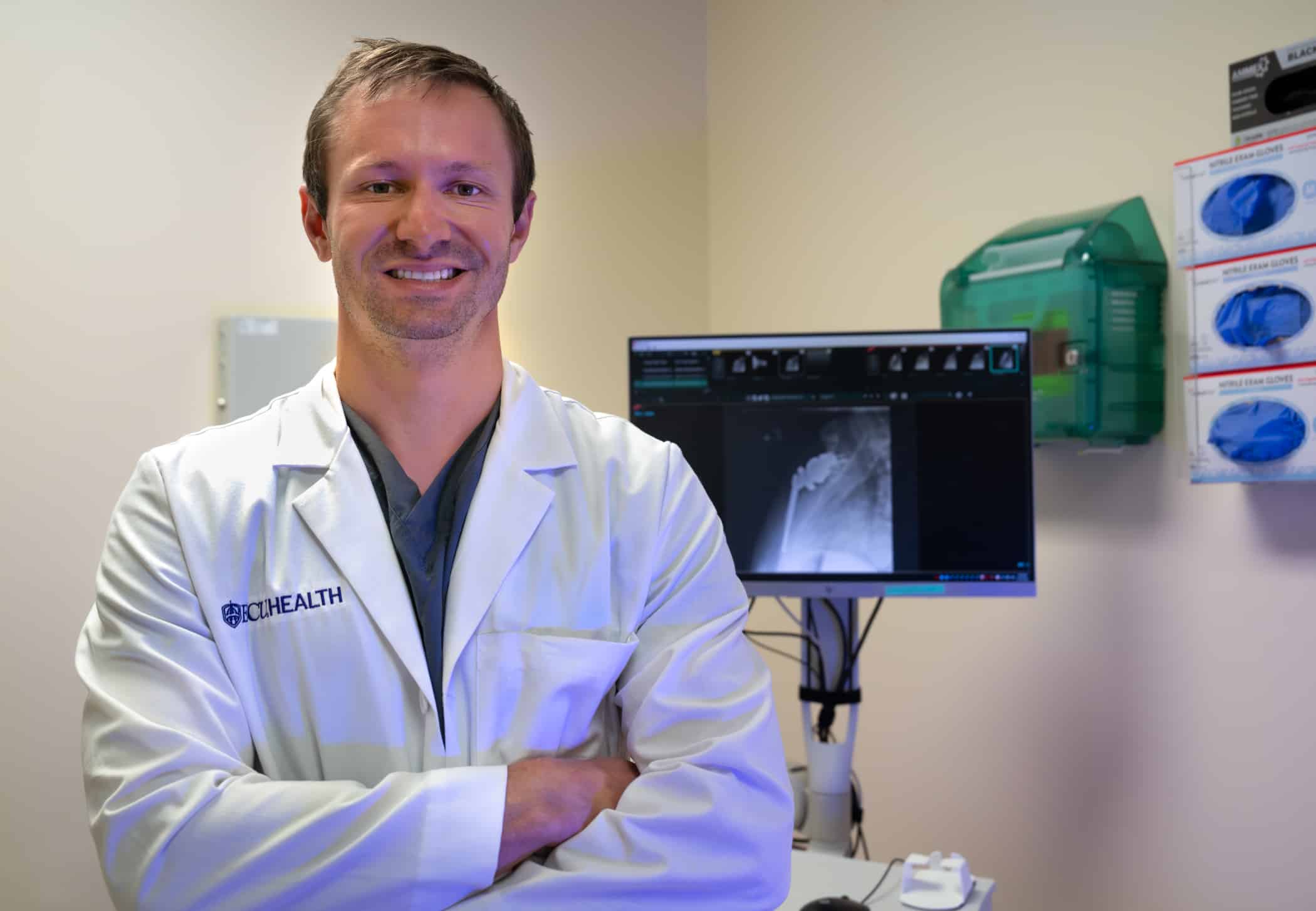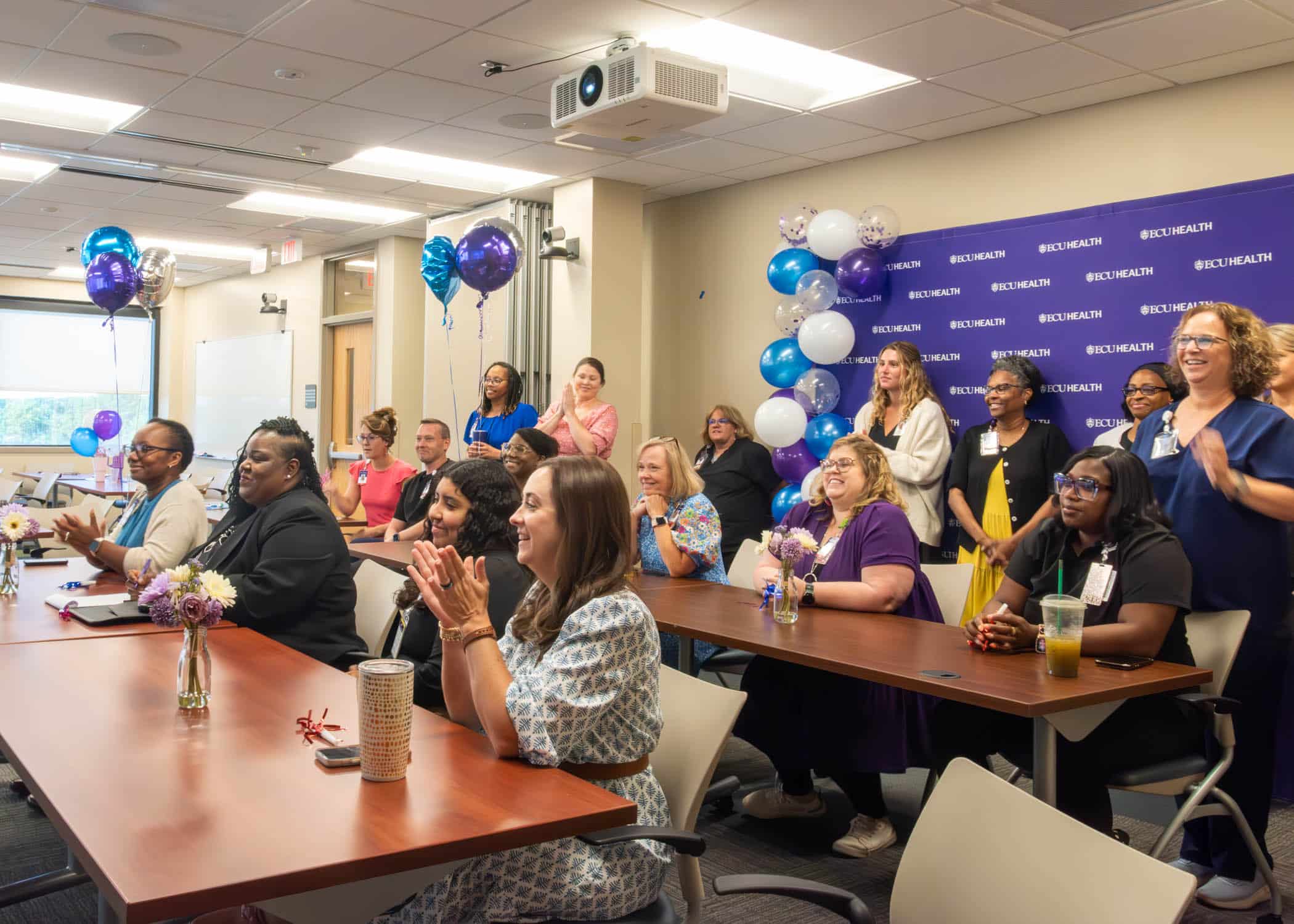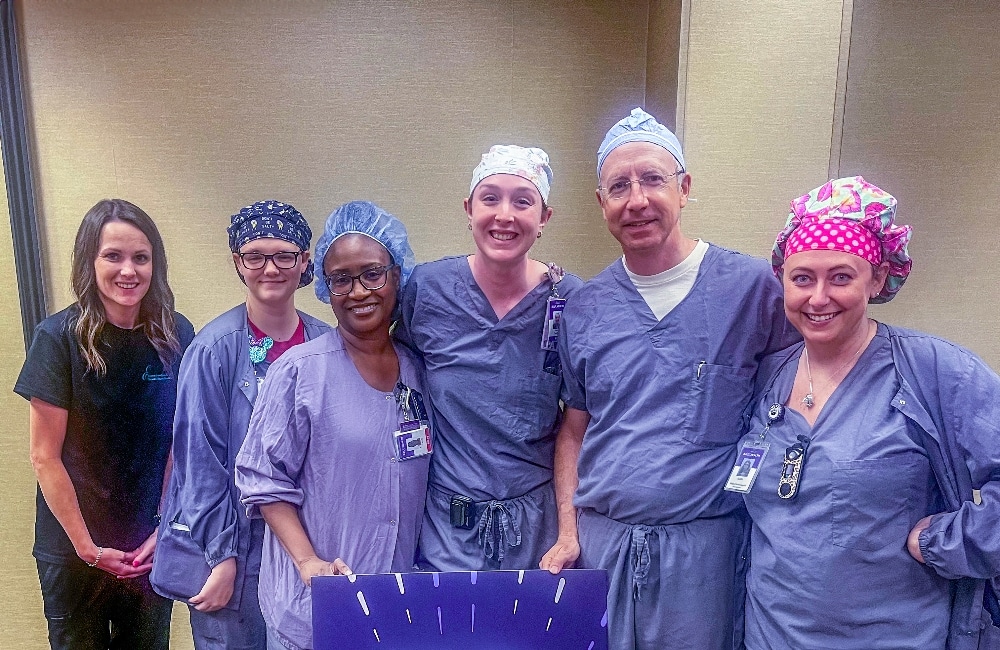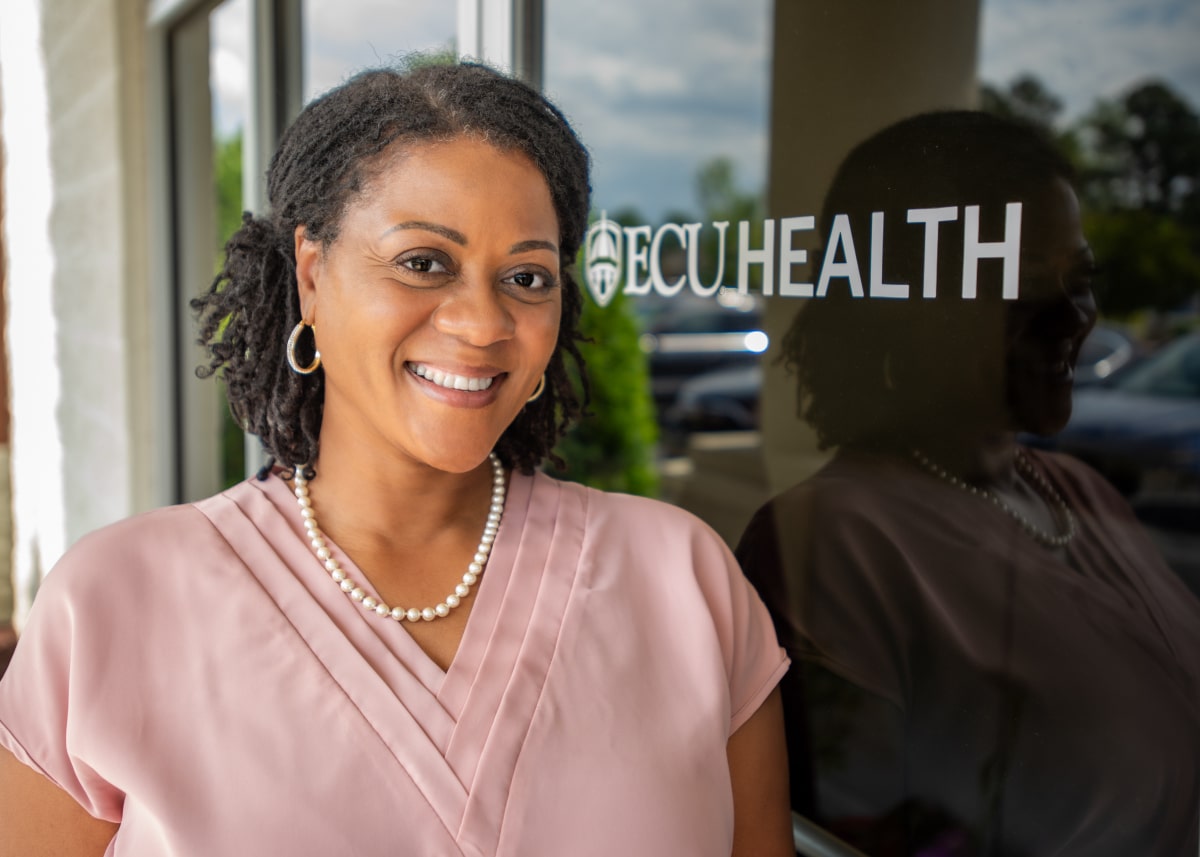As part of its commitment to providing high-quality care to the people of eastern North Carolina, ECU Health now offers innovative advanced 3-D shoulder replacement surgery, providing a new solution for patients with complex shoulder joint damage. This cutting-edge procedure is designed to relieve pain and restore mobility for individuals suffering from conditions such as osteoarthritis, rotator cuff injuries and fractures.
According to Dr. Shawn Yeazell, ECU Health orthopedic surgeon, patients can sometimes have one or more shoulder replacements that failed or wore out, which leaves only a little bit of bone to work with, so traditional implants don’t work.
“We have an aging population, which is increasing the demand for orthopedic procedures like joint replacements,” said Dr. Yeazell. “We want our patients to live comfortably and to be able to do the things they love, so having the ability to provide complex procedures to relieve pain and joint immobility is crucial.”
Traditional shoulder replacement surgeries involve removing damaged bone and replacing it with standard metal and plastic parts. According to Dr. Yeazell, standard shoulder replacement parts work for most people who need a procedure. However, in cases where bone is missing or existing bone is poor quality, standard parts may not be sufficient.
“There’s a certain amount of bone that’s required for a traditional replacement,” said Dr. Yeazell. “The 3-D printed shoulder replacement surgery is a solution for those patients who would have no other option.”
The 3-D shoulder replacement process begins with doctors performing CT scans of the patient’s shoulder. These scans are then sent to an outside vendor, which creates 3D-printed joint replacements custom-fitted to the patient’s anatomy. This personalized approach allows orthopedists to perform surgeries with greater precision and effectiveness.

“Being able to perform cutting-edge procedures like 3-D joint replacement surgeries close to home is critical in caring for our region,” said Dr. Yeazell.
By offering 3-D shoulder replacement surgery, ECU Health is enhancing the quality of life for patients with complex shoulder conditions, ensuring they can continue to enjoy their daily activities pain-free. Dr. Yeazell is the first surgeon to bring the Zimmer Biomet 3-D custom Vault Reconstruction System (VRS) implant and associated technology to the ECU Health System.
To learn more about ECU Health’s orthopedic services, visit www.ecuhealth.org/ortho.
Dr. John Catanzaro, professor and chief of the Division of Cardiology at the Brody School of Medicine at East Carolina University and director of the East Carolina Heart Institute at ECU Health Medical Center, was recently honored with the prestigious Dr. John “Jack” Rose Distinguished Professorship, recognizing his significant contributions to improving health care delivery, excellence in clinical medicine, administration and academic advancement, including formation of the first Clinical Cardiac Electrophysiology Fellowship at ECU Health.
The Rose Professorship, established by ECU Health and East Carolina University through the ECU Health Foundation and state funds, honors Dr. Rose, a renowned cardiologist and professor. This endowed title supports the director of the East Carolina Heart Institute recognizes Dr. Rose’s exceptional contributions to cardiology and medical humanitarian work. Dr. Rose, who joined ECU Health in 1982 and the Brody School of Medicine in 1990, is celebrated for his dedication to patient care, teaching, and community service. Recipients of this professorship are expected to embody his ideals and passion for teaching, inspiring future generations of medical professionals.
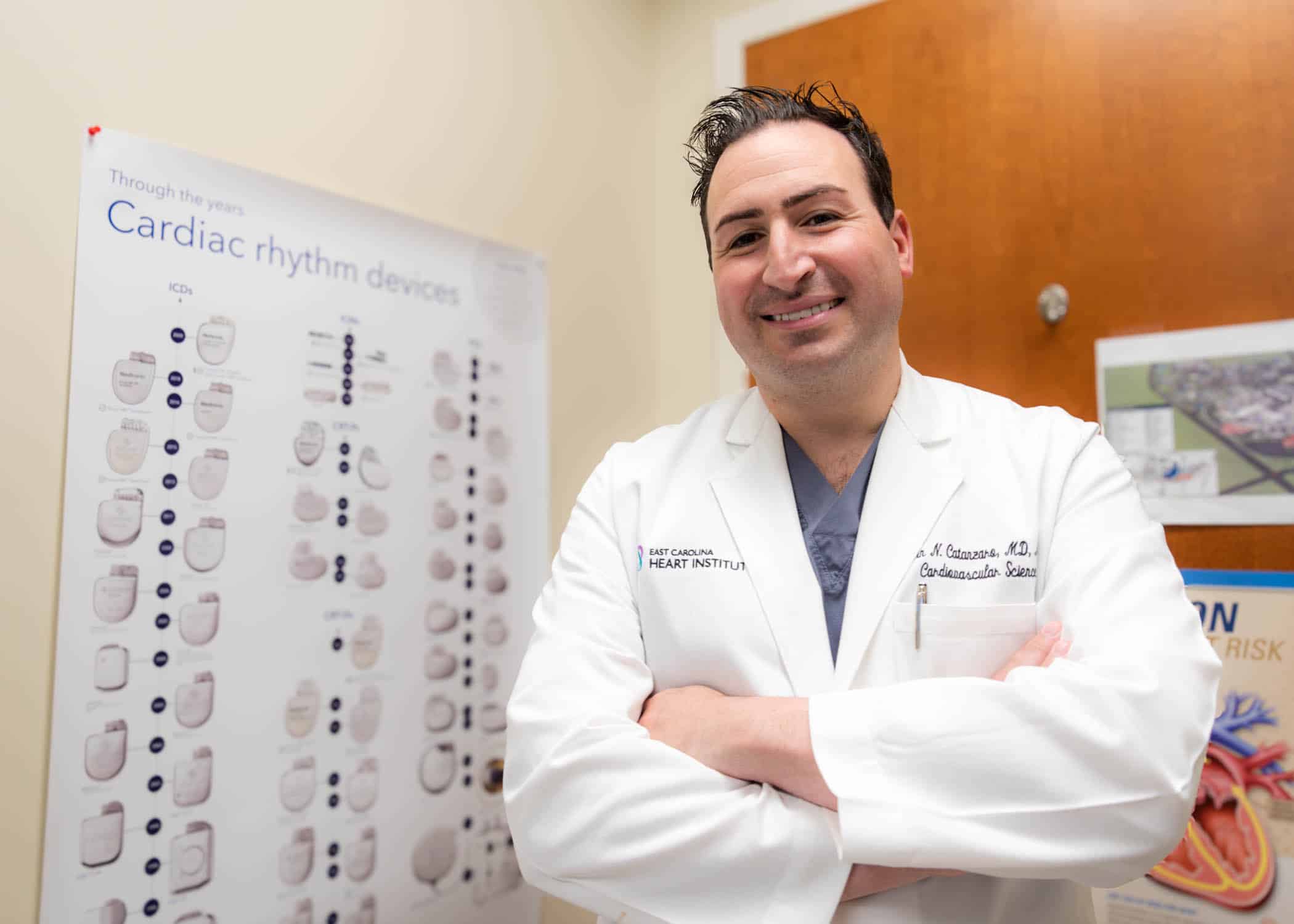
“It’s an honor to be named to the Rose Professorship,” said Dr. Catanzaro. “This title not only recognizes Dr. Jack Rose’s work and legacy, which is focused on humanitarianism and the humanistic qualities of medicine, but it also allows me to highlight and continue his remarkable contributions. As program director, I perform hands-on teaching with trainees during cardiac procedures as well as teach didactic sessions. My primary role is to train the next generation of electrophysiologists to increase access to the patients of eastern North Carolina while maintaining a high standard of excellence in administration and leadership. This professorship is an opportunity to advance Dr. Rose’s legacy of teaching, administration and leadership, ensuring that his impact endures in these areas.”
Dr. Catanzaro completed his Doctor of Medicine with distinction in research at SUNY Downstate Medical Center, followed by an internal medicine residency and cardiovascular disease fellowship at North Shore University Hospital and a clinical cardiac electrophysiology fellowship at The Johns Hopkins Hospital. He also holds an MBA from the University of Florida. He is a Fellow of the American College of Cardiology, Heart Rhythm Society European Heart Rhythm Society and European Society of Cardiology. Dr. Catanzaro is actively involved with the Heart Rhythm Society’s Atrial Fibrillation Stroke Prevention Task Force and serves as vice chair of their Quality Improvement Committee. Nationally recognized for his work, Dr. Catanzaro has delivered invited presentations and chaired panels in the U.S., France, Italy, Germany, England, Romania and more. He also performed recorded procedures for the Heart Rhythm Society Scientific Sessions.
Dr. Catanzaro wanted to transition to an administrative role to broaden his impact beyond individual patients to the entire region and the cardiology division.
“We thought he was the best person for the future of cardiology,” said Dr. Mark Iannettoni, W. Randolph Chitwood, Jr, MD, Distinguished Chair in Cardiovascular Sciences, Brody School of Medicine at ECU and chief, Cardiovascular Service Line at the East Carolina Heart Institute at ECU Health Medical Center. “Dr. Catanzaro possesses a highly entrepreneurial spirit, bringing significant innovation to ECU Health. He has developed new techniques and devices in electrophysiology, advancing our capabilities in device management and patient care.”
The Rose Professorship comes with an endowment, managed by the university, to support ongoing and future initiatives in medical education and innovation. The endowment provides approximately $64,000 annually to advance the cardiology division’s educational and innovative efforts, supporting activities such as purchasing educational equipment, facilitating attendance at conferences, and other educational pursuits.
“The professorship facilitates innovation within the field by providing the necessary funding for new initiatives, such as introducing new devices,” said Dr. Catanzaro. “The goal is to use a certain amount of the endowment each year to support these innovations and to produce more trained physicians for the region. This helps establish our institution as a center of excellence and makes our advancements known.”
Dr. Catanzaro utilized part of the endowment to establish a two-year Electrophysiology Fellowship, admitting one fellow per year, starting this year. Electrophysiologists treat heart rhythm disorders and heart failure with electric devices inserted into the heart. As part of the fellowship, doctors will learn about pacemakers, defibrillators, implantation, ablations, leadless pacemakers, and left atrial appendage closure devices.
“This was one of the fastest fellowships from concept to establishment that we’ve ever done, which just goes to show you how much drive Dr. Catanzaro has,” said Dr. Herb Garrison, former associate dean for ECU’s Brody School of Medicine Graduate Medical Education. “It typically takes two to three years to establish a new residency or fellowship, and we did this in less than a year. That was a record time. And part of that had to do with Dr. Catanzaro and Alyson Riddick, who did an excellent job putting the application together.”
Dr. Jan Lopes is the first fellow in the Electrophysiology Fellowship at ECU Health. He learned about the new program through his cardiology fellowship leader in El Paso, Texas, and decided to join the fellowship because of Dr. Catanzaro’s strong vision for the program.
“Dr. Catanzaro’s enthusiasm for the program and education, along with the opportunity to shape the program for future fellows, attracted me to the fellowship,” said Dr. Lopes. “Despite being a new program, it feels well-established and highly developed. I feel incredibly supported in my role and am receiving top-tier training that rivals what is offered at major medical centers nationwide. We are utilizing cutting-edge technology and performing the latest procedures here at the medical center.”
Training doctors like Dr. Lopes with the latest technology and procedures is important for the future of health care. The need for well-trained electrophysiologists is increasing across the nation and here in eastern North Carolina, according to Dr. Garrison.
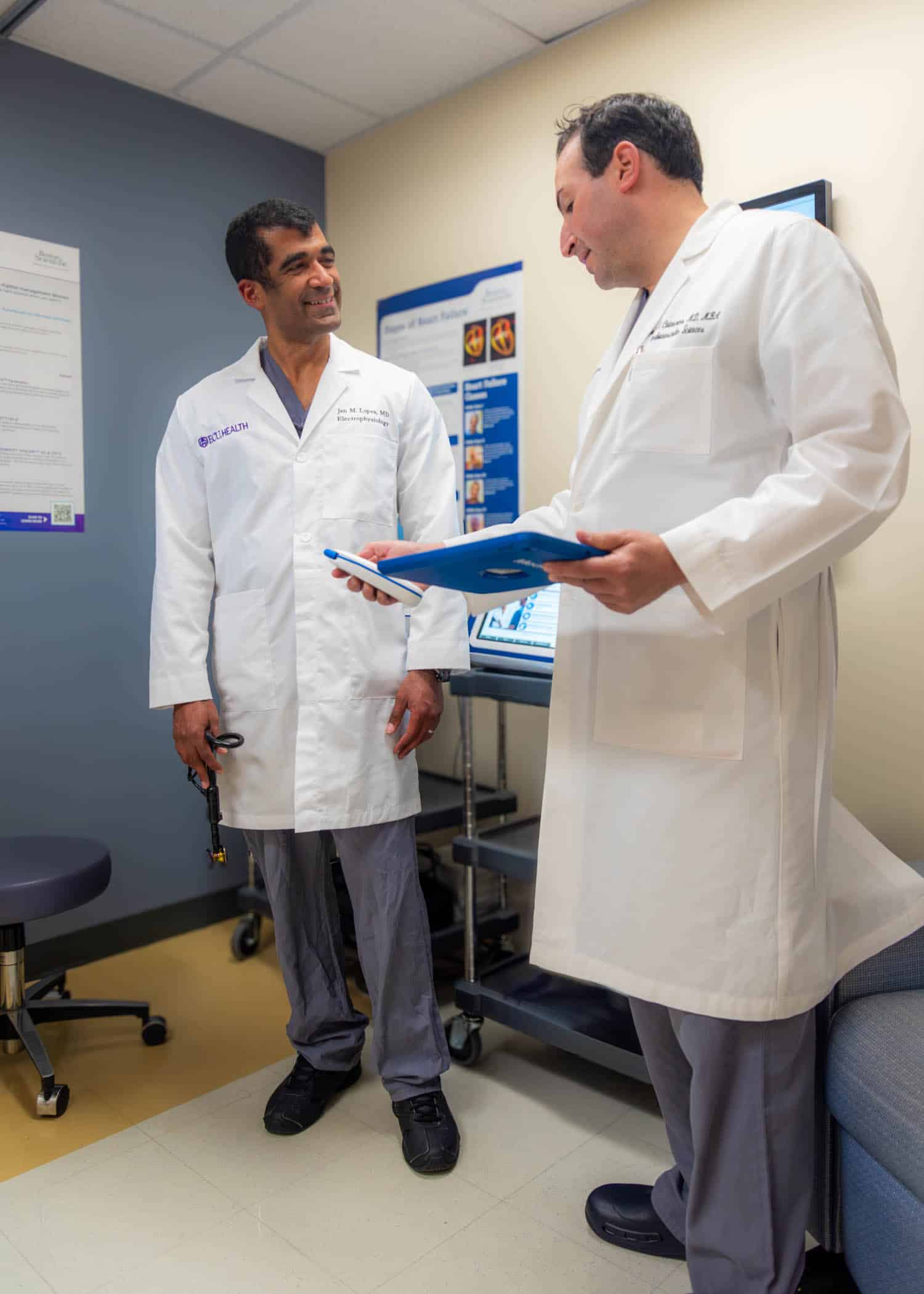
“The incidence of arrhythmias, along with the need for pacemakers and defibrillators, is rising as the population ages, making it a critical area of focus,” said Dr. Garrison. “Establishing residencies and fellowships serves two main purposes: recruiting top-tier faculty and creating a pipeline of skilled electrophysiologists. Faculty are attracted to institutions with trainees, and enhancing our program with excellent faculty was a strategic move by Dr. Catanzaro. This initiative ensures we have the necessary capability and qualified physicians to meet the growing demand for electrophysiology services.”
With the increasing demand for physicians and electrophysiologists trained to treat rural patients, Dr. Catanzaro’s efforts at ECU Health is paying off in the form of improved recruitment efforts.
“Dr. Catanzaro has successfully attracted numerous cardiologists,” said Dr. Iannettoni. “He has excelled at developing divisions within the cardiology department and navigating the integration of academia and medicine. His efforts have resulted in many of our graduates choosing to stay with us, which is a significant benefit of our program. We’re proud to retain our own trainees, ensuring continuity and excellence in our team.”
Each summer, teenagers from across eastern North Carolina dedicate a portion of their summer to serve their community at ECU Health hospitals across the region.
The VolunTeen Program is designed to teach students ages 15-17 the value of community service and to provide experiences that foster growth and maturity. The program runs from June to August and volunteers serve at least one shift per week at the hospital.
At ECU Health Medical Center, 122 teens completed 4,717 hours of service across 39 departments this summer. Sara Tingen, volunteer services coordinator at ECU Health Medical Center, said this year was very successful and they hosted their largest group of VolunTeens since the onset of the COVID-19 pandemic.
While the volunteers serve in many roles across the hospital, Tingen said patient transporting from one area of the hospital to another is one of the most important tasks.
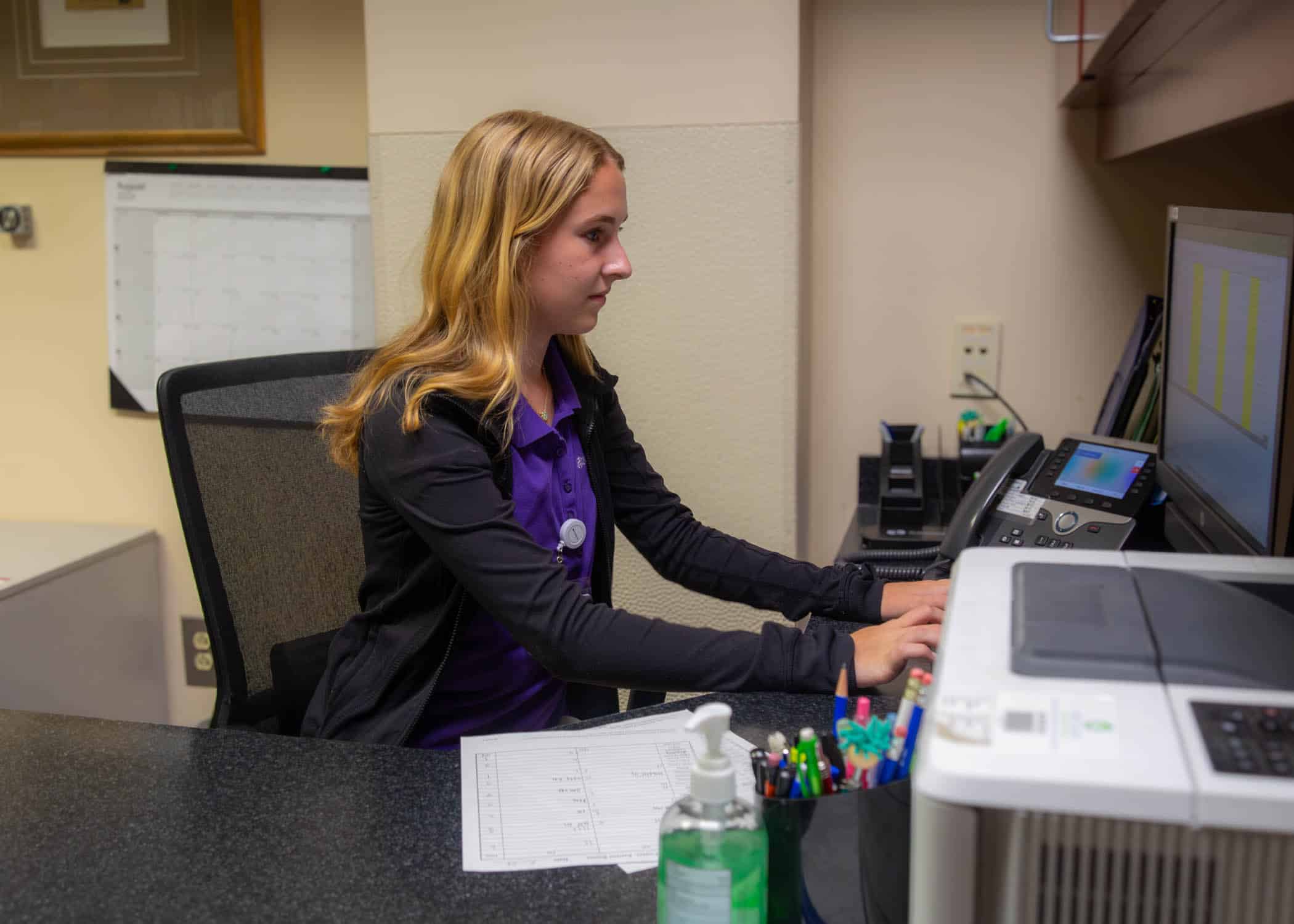
“The (ECU Health) Cancer Center alone can see 400 people in one day,” Tingen said. “That’s a lot of time it would take for a nurse or other team members to transport a patient, they rely heavily on our transport volunteers. They can just pick up the phone, say, ‘Hey, I need this person to go here to there.’ And it’s done, they can move on to caring for their next patient. We’re proud to be a smiling face and someone patients can connect with while we help them get around.”
Emily Anthony recently finished her third summer in the VolunTeen Program, where she spent her time escorting patients, assisting the Volunteer Services team on projects and serving as a leader for other VolunTeens.
She said her favorite part of the VolunTeen Program is talking to patients and team members while also making connections with her fellow VolunTeens. Emily is entering her senior year of high school and wants to pursue health care.
“It’s really great to get experience in health care, because I want to do something in health care, maybe a nurse,” she said. “The first summer, I just thought it would be a good experience to do the VolunTeen Program but I just loved working in the hospital. I worked in a unit the first summer with all the nurses and I just loved it.”
Christopher Latimer is entering his sophomore year of high school and said he had a great experience in his first year as a VolunTeen. He’s already decided he’ll join again next summer.
He said he’s had an interest in nursing and getting first-hand experience working alongside nurses has helped him understand the day-to-day work of a nurse in a hospital setting.
“I was on 2 South most of the time and I worked in the Cancer Center as well,” Christopher said. “They were both good experiences. I was going around, asking patients questions and seeing if I could help them in any way. I helped the care partners, seeing if I could help out the nurses with anything, really. I’m thinking about nursing and I’m going to also try and do different areas the next time I VolunTeen to see more and just kind of see my options in health care.”

Chad Tucker, director of Volunteer Services at ECU Health Medical Center, said Christopher’s experience is exactly what the program hopes to give back to the local students who are spending their time serving their community.
“This program is an investment in our future,” Tucker said. “A lot of these students are going into college and they get a chance to see the hospital first hand. It’s so rewarding when you see former VolunTeens who are in medical school, or they’re nurses here, they’re respiratory therapists, they are in various capacities and they attribute part of their foundation to the VolunTeen Program. These young people are able to help team members and the patients we serve, but it also gives them help in their careers.”
The program also offers Leadership Sessions for VolunTeens, which gives them a chance to see unique areas of the health system and opportunities for skill development. In one session, the group visited the EastCare helipad, learned about the team, got to look around the inside of a helicopter and even saw a landing.
In another session, the Human Resources and Workforce Development team worked on resume building and shared interview tips with the VolunTeens.
“We have quite a few seniors who are coming up on college applications so if they’re interviewing for jobs or interviewing for scholarships, it just gives them a good perspective on how to navigate possibly their first interview as a young adult,” Tingen said.
We’re proud to support the VolunTeen Program at ECU Health Medical Center and select ECU Health Community Hospitals and we’re grateful for the teen who step up each summer to help us serve eastern North Carolina.
To learn more about the VolunTeen Program and other volunteer opportunities at ECU Health, visit ECUHealth.org/Volunteers.
It is no secret that medical residency can be stressful. The three-to-seven years doctors spend as a resident are jam packed with experiences that prepare them for a career in the fast-paced environment of health care.
For ECU Health Medical Center residents, that stress is left behind the moment they walk into the brand-new Resident Well-Being Zone – a space intentionally designed to ensure they can take time to relax, reflect and focus on their own well-being.
Located on the 6th floor the Eddie and Jo Allison Smith Cancer Center at ECU Health Medical Center, the Resident Well-Being Zone is filled with all the essentials a resident may need: exercise equipment, charting space, healthy snacks, coffee, even a ping-pong table and more. It is thoughtfully designed with experience in-mind, according to ECU Health Chief Well-Being Officer Dr. Christina Bowen.
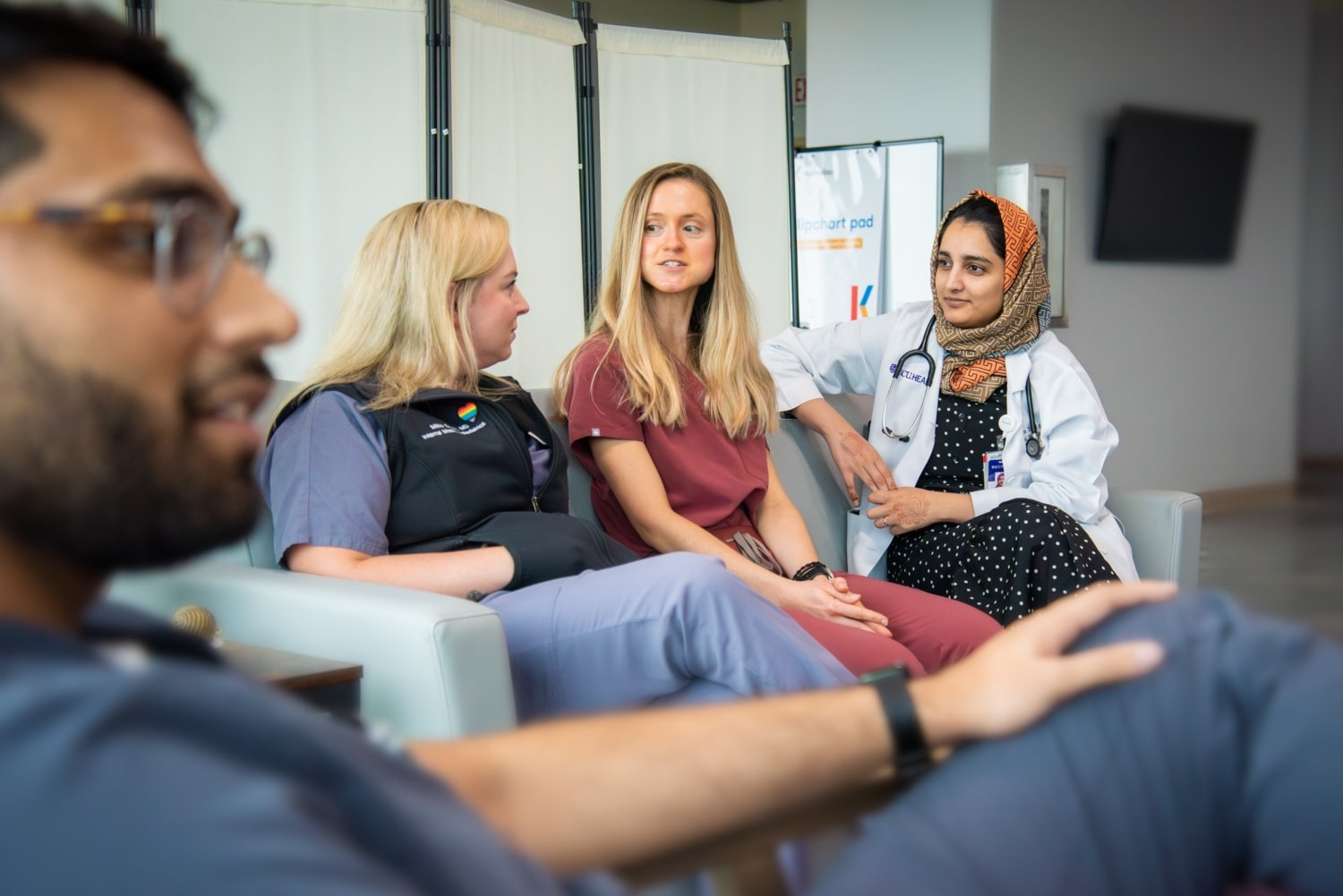
“Residency has a quite a bit of emotional labor,” said Dr. Bowen. “Learning at an incredibly rapid pace and being exposed to cases that pull at your heart strings can be stressful. How do you deal with those challenges and manage those emotions and still be prepared to provide high-quality care? We believe that having a space for residents to decompress, even if for 5 or 10 minutes during their day can help them to continue to focus on their learning and care of patients as well as support their personal well-being. Many times they will be able to walk up to the Well-Being Zone and connect with a fellow resident who is having a similar experience which is a concept called common humanity which we know supports self-compassion. Residents’ compassion for themselves helps them as they share compassion with their patients and colleagues helping to create a culture where they can thrive.”
The Resident Well-Being Zone opened in June but it is a space that’s more than five years in the making. The idea was sparked when ECU Health CEO and Brody School of Medicine at East Carolina University Dean Dr. Michael Waldrum saw an article about a similar effort at another health system. With a grant from the ECU Health Foundation and partnership from the General Medical Education Well-Being Committee, the Resident Well-Being Zone was launched to immediate fanfare, with residents flocking to the ping-pong table.
“We’re all excited about the Well-Being Zone and thankful to ECU Health and the GME Well-Being Committee for prioritizing our wellness while on the wards,” said Dr. Natalie Malpass, a third-year family medicine resident at ECU Health Medical Center. “It’s great to have a space of our own where we can re-center and re-charge, even if only for a few minutes. Between the inviting couches, the ping pong table, coffee bar, and workstation for when the pager inevitably goes off, the committee really thought of everything.”
The opening of the Resident Well-Being Zone is a culmination of years of planning, but Dr. Bowen said this is only the beginning. She is planning to build on the initial success by adding well-being pop up events throughout the year.
“This Well-Being Zone is an example of the amazing collaboration we have here at ECU Health,” said Dr. Bowen. “We were able to identify a need and partner with many teams across the organization to make this unique space possible. We are grateful for our residents and we hope they feel their well-being is supported so they can continue to do the important work of caring for patients and furthering their knowledge of compassionate medicine.”
As an academic health system, ECU Health serves as both a rural care delivery organization and a training ground for health care providers and support services team members.
While resident physicians and nurses come to mind as the most obvious roles that blend the clinical and academic environments, a new resident track is helping bridge an important need for patients across eastern North Carolina who are Deaf or Hard of Hearing: the ECU Health American Sign Language (ASL) Residency program.
Launched in April, the ASL Interpreter Residency program was born from the demand for more skilled ASL medical interpreters. The program is designed to help increase the number of ASL interpreters available to patients across ECU Health’s system, in both hospitals and clinics, as well as train the next generation of interpreters for a career in the medical field.
More than 500,000 people throughout the United States use ASL to communicate as their native language, making ASL the third most common language in the United States, after English and Spanish, according to the Commission on the Deaf and Hard of Hearing.
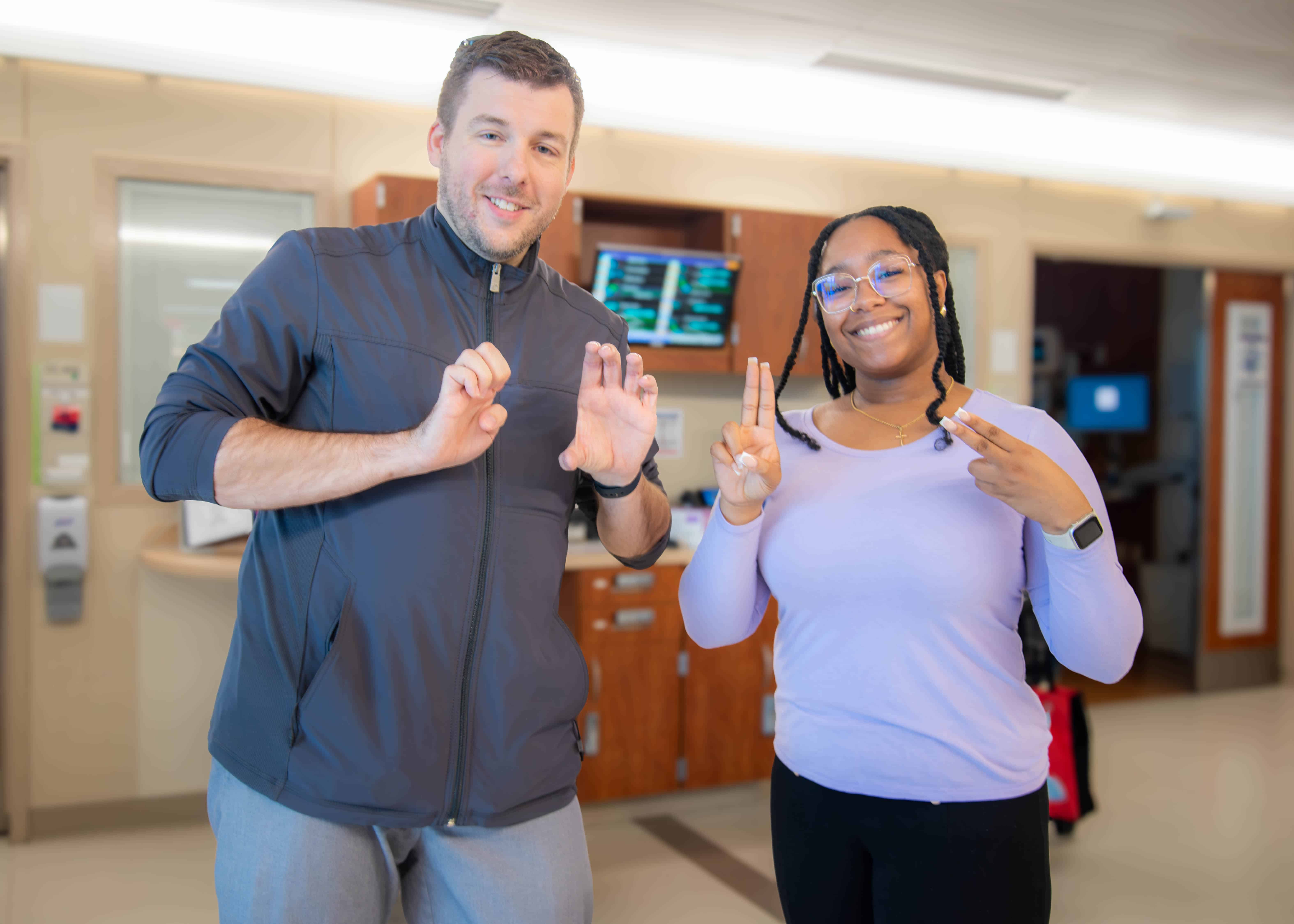
“There is a massive need for ASL interpreters in health care both nationally and locally,” said ECU Health ASL coordinator Reid Barnes, who designed the program. “When we looked at this need in the lens of our role as an academic health system, it made sense to model something similar to the physician resident experience.”
Residents in the program join with a two-year commitment where they focus on skill development and clinical interpreting during their first year, with close supervision in the clinical setting. The second year of the program incorporates both hospital and clinical work while also assisting with ongoing educational efforts.
Barnes, ECU Health’s only full-time ASL interpreter, works with up to 6 or 7 patients on any given day, often times spread across the health system’s 29 county service area, so the demand is obvious. What is less obvious, however, is the process behind becoming a skilled medical ASL interpreter.
A licensed or certified ASL interpreter does not receive a specialized certificate in medicine. ASL interpreters undergo rigorous testing to ensure they have generalized competencies for a multitude of interpreting settings. However, the decision to specialize in any setting is left to the individual interpreter. Specialization often involves an extensive combination of targeted workshops and firsthand experience. As a result, it is often difficult for newer interpreters to safely gain firsthand experience.
All of these factors, Barnes said, inspired the creation of the ECU Health ASL Interpreter Residency program.
“Health care should always be provided in a patient’s native language,” said Barnes. “Imagine what your health care experience would feel like if you couldn’t communicate with your doctors and nurses in your primary language? For the Deaf and Hard of Hearing community, that is a very real reality. We can now expand our services, improve patient experiences and be a true training ground for skilled medical ASL interpreters.”
Jordan Satchell is the first ever resident in the ECU Health ASL Interpreter Residency program. Having served as an experience coordinator in ECU Health Medical Center’s emergency department, she has a close understanding of the important role ECU Health serves as the flagship health system in eastern North Carolina.
“Returning to ECU Health as the first ASL Interpreter Resident has been a rewarding experience in many different ways,” said Satchell. “You never truly ‘arrive’ when it comes to interpreting, so this program has allowed me to build my skills and improve my knowledge about health care. The patients I work with have already helped me become a better interpreter, and I can only hope to continue serving them, learning their needs, breaking down communication barriers, while also being a resource to the next incoming resident.”
Barnes said Satchell will help chart the future of the program, as the two work together to closely examine the needs of the patient population while tailoring the program’s design to ensure it provides the best resident experience possible.
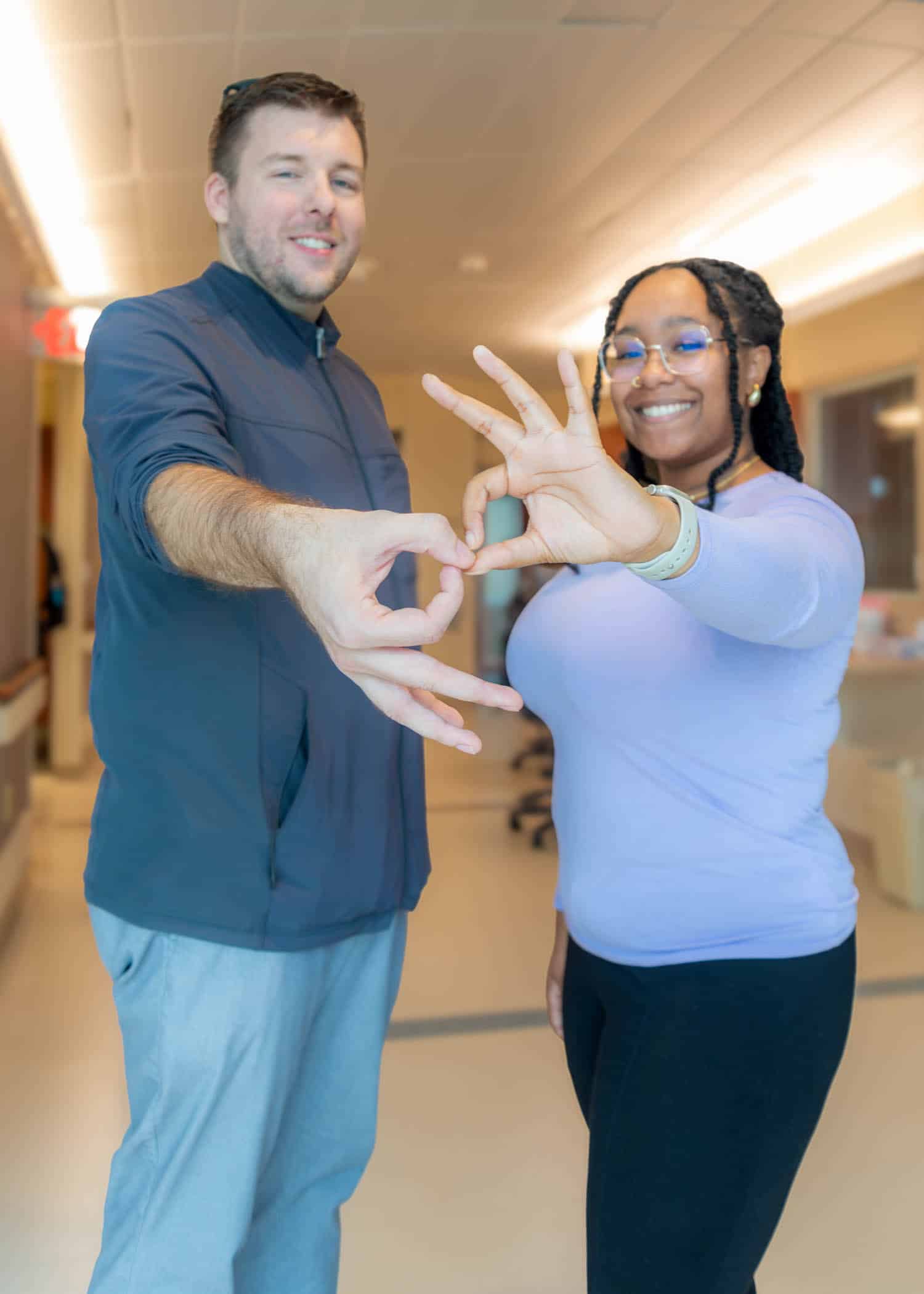
ECU Health’s Blue Zones Partnership has been awarded the North Carolina Hospital Association’s 2024 Highsmith Award for Innovation. Named for Dr. John Highsmith, the first president of NCHA, this award is presented to a member institution or to an individual/team employed by an NCHA member institution in recognition of innovation that creates value for patients/consumers of healthcare.
ECU Health received the award July 18 at NCHA’s Summer Membership Meeting. Led by Dr. Christina Bowen, board certified in family medicine, lifestyle medicine and integrative medicine, and in partnership with the communities, this innovation shows ECU Health breaking down barriers to encourage healthier lifestyles, better health and longevity by partnering with Blue Zones.
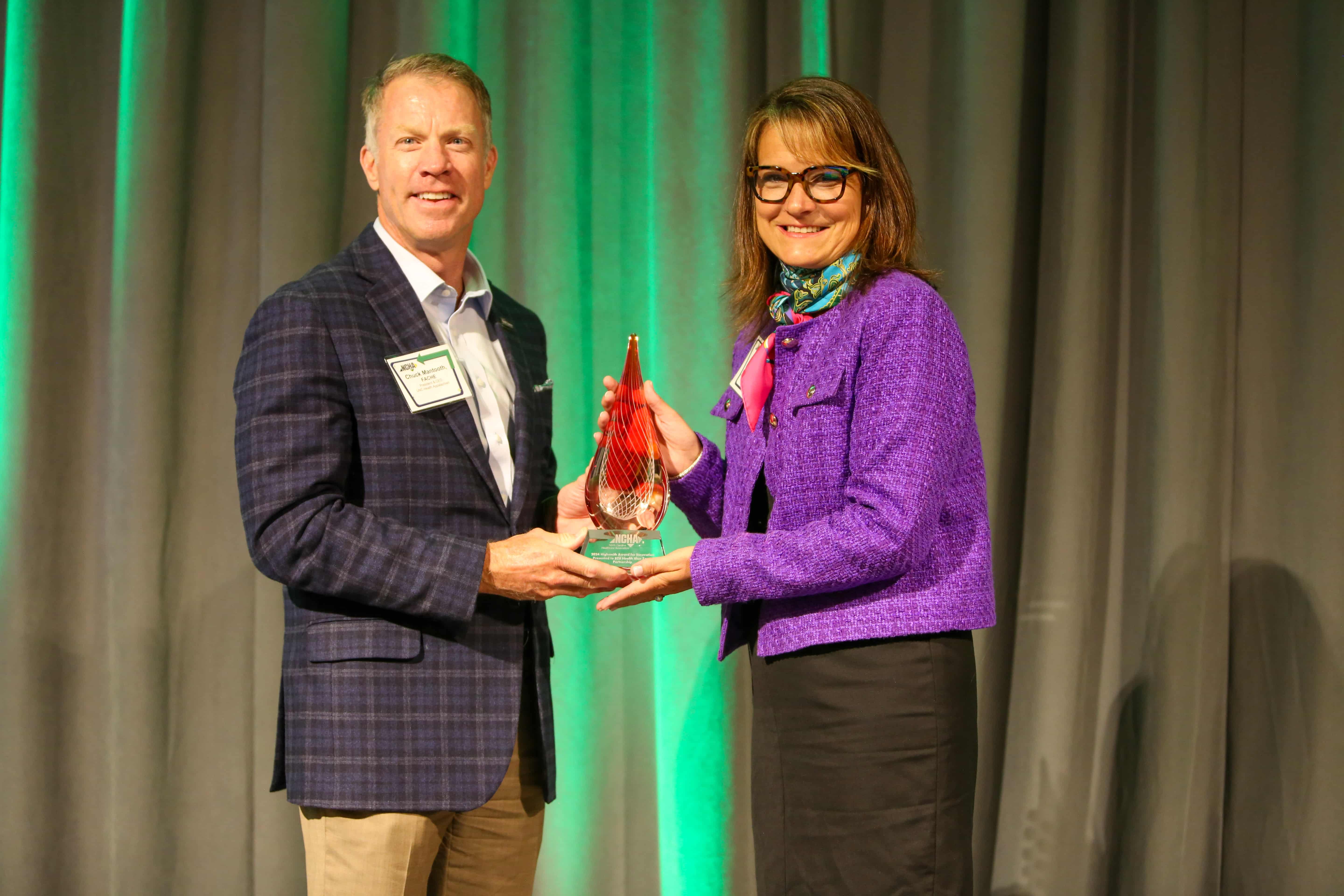
“It is truly a blessing to accept this award on behalf of the teams at ECU Health who work tirelessly to live our mission of improving the health and well-being of eastern North Carolina,” said Dr. Bowen. “ECU Health has a vision to become the national model for academic rural health and wellness. Moments like this are a reflection of the progress we continue to make in pursuit of that vision.”
Blue Zones is a company founded by Dan Buettner, an internationally recognized researcher, explorer, and National Geographic fellow to implement new lifestyle choices to boost the health and well-being of entire communities by making lasting change in the places where people live, work, learn and play.
Together, ECU Health and Blue Zones champion a community-led well-being initiative that convenes key stakeholders and national well-being experts to introduce evidence-based programs and collaborate to bring about permanent changes to the environment, policy and social networks across eastern North Carolina.
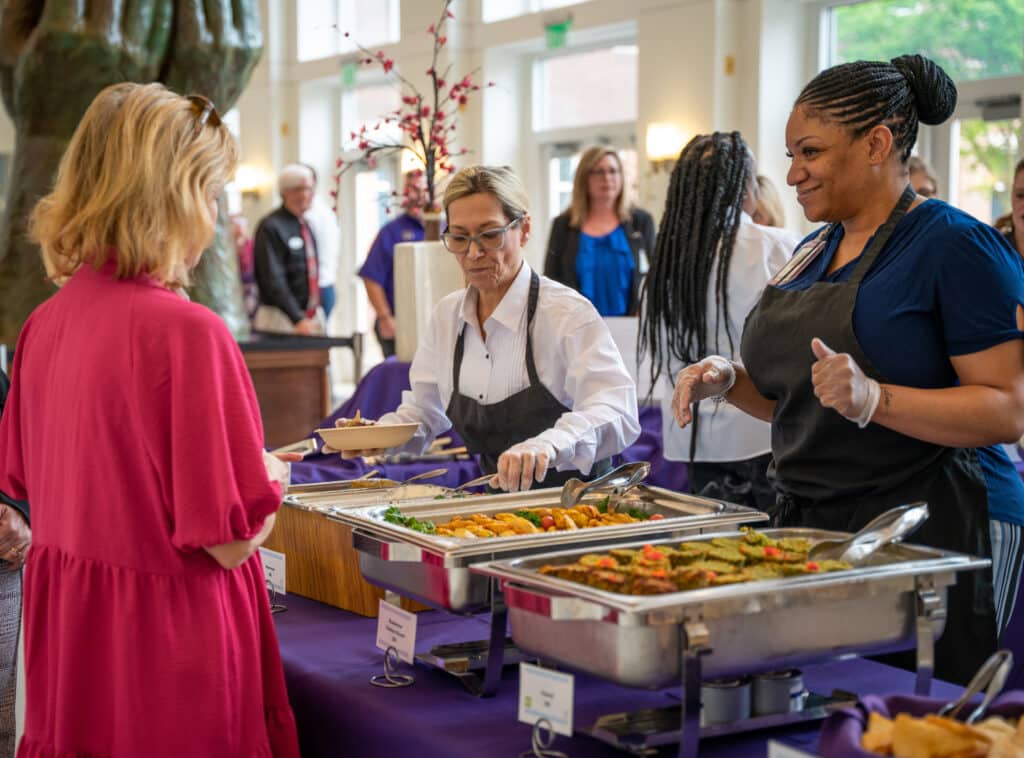
The four Blue Zones initiatives implemented by ECU Health include the Team Member Blue Zones Challenge, Plant-Forward Meals, Wellness Center Blue Zones, and targeted initiatives in Bertie, Chowan and Dare County. ECU Health is prioritizing the community and engaging in partnerships with local foodbanks and churches to spread the word of the initiative – and make sure the community knows that healthy, plant-forward food is not only nutrient-dense, but also delicious.
Through their faith based partnerships, ECU Health has started a Blue Zones initiative with local pastors in the Pitt County area to bring these concepts of health and well-being to their congregations. The partnership has resulted in tremendous improvements and ECU Health will continue to partner with Blue Zones to implement strategies for holistic well-being.
ECU Health recognized the importance of having an executive leader with a sole focus on team member and clinician well-being, which is why Dr. Bowen was named their first Chief Well-being Officer. Dr. Bowen’s scope includes ECU Health’s lifestyle medicine clinics, wellness centers, and internal Employee Assistant Program.
These initiatives are just the beginning of the ECU Health mission-driven dream of their service area becoming environments that improve health and well-being.
Greenville, N.C. – The Nurse Residency Program at ECU Health Medical Center achieved re-accreditation from the American Nurses Credentialing Center’s (ANCC) Commission on Accreditation Practice Transition Programs (PTAP) through July 2028. ANCC Practice Transition Accreditation validates hospital residency or fellowship programs that transition registered nurses (RNs) and advanced practice registered nurses (APRNs) into new practice settings that meet rigorous, evidence-based standards for quality and excellence.
“I am proud to recognize and celebrate the incredible contributions of our ECU Health nurses who exemplify the mission, vision and values of ECU Health through their exceptional care in our hospitals and clinics,” said Trish Baise, DNP, RN, NEA-BC, FACHE, chief nursing executive, ECU Health. “The Nurse Residency Program at ECU Health Medical Center plays a crucial role in recruiting and retaining excellent nurses that are passionate about serving eastern North Carolina. I take pride in our ECU Health nursing community, and I am grateful to every nurse who chooses ECU Health as their professional home.”
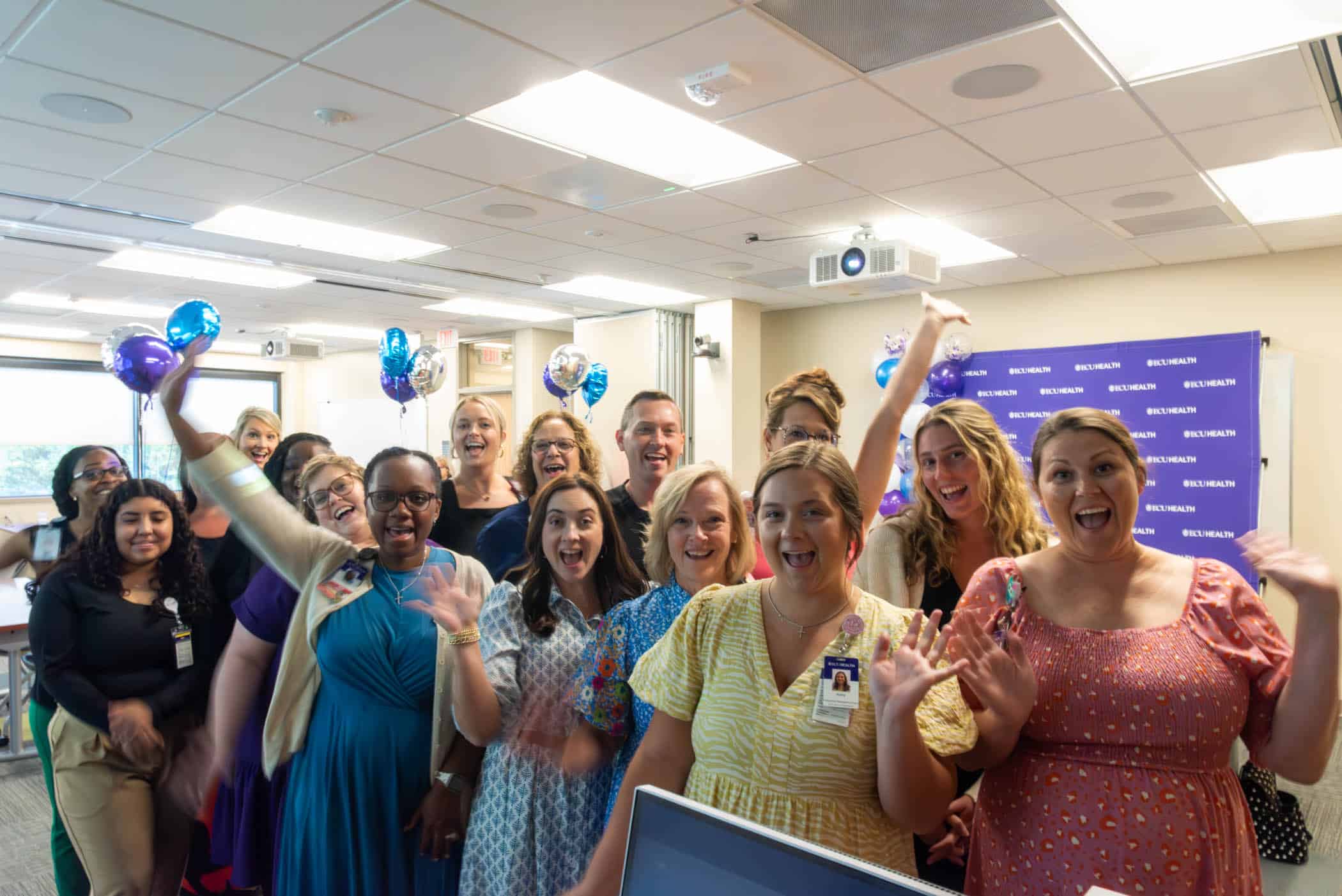
Nurses in accredited transition programs, like ECU Health Medical Center’s, experience curricula that promote continued knowledge, skills and professional behaviors necessary to deliver safe, high-quality care. The Nurse Residency Program at ECU Health Medical Center started in 2009 with the goal of offering high-quality continued learning for nurses in new clinical settings. The year-long program includes about 200 new graduates per year. The program’s one-year retention rate is about 87 percent; the national average is about 67 percent.
“ECU Health takes great pride in the Nurse Residency Program being acknowledged by ANCC as a premier transition program for nurses,” said Takisha Williams, DNP, RN, NPD-BC, nursing education specialist and director of the Nurse Residency Program at ECU Health Medical Center. “Our program is grounded in evidence-based practices to foster exceptional nursing care. ANCC accreditation provides nurse residents and fellows with confidence in our program, ensuring a structured path to development, rigorous evaluation methods, and measurable learner outcomes.”
ANCC accreditation gives nurse residents and fellows assurance that ECU Health offers an elevated transition program with a clear course of instruction and reliable evaluation methods. With ANCC Accreditation, ECU Health’s transitioning nurses gain the skills and confidence needed to perform effectively within a new practice setting.
On June 30, Dr. Herb Garrison retired as the associate dean for East Carolina University’s (ECU) Brody School of Medicine Graduate Medical Education (GME), after serving in that role for the past 11 years and after serving ECU and ECU Health for 29 years. He leaves a legacy of growth and success for the GME program, including the formation of the Rural Family Medicine Residency Program, as he looks forward to his next adventure.
The Charlotte native said his interest in health care began in part because of a “genetic predisposition.”
“My dad drove an ambulance and my mom was a nurse,” Dr. Garrison said. “Growing up, I was intrigued by fire trucks, and I was interested in first aid. I took a first aid class in high school because I wanted to be sure I knew what to do if something bad happened to someone.”
Dr. Garrison also worked in a nursing home as a high school student where some of his co-workers encouraged him to attend nursing school. “It was a diploma program, so we were thrown into the clinical aspect pretty quickly,” he recalled. “I liked it and had an aptitude for it, but I wanted to do what the doctors were doing.” Someone suggested he go back to school to become a physician assistant (PA), so he went to the Medical University of South Carolina. Still, his itch wasn’t scratched; he wanted to be a physician. “I applied to the University of North Carolina (UNC) at Chapel Hill, but my grades weren’t good enough to enroll as a pre-med undergraduate.”
Undeterred, Dr. Garrison went to Wingate Junior College for two years to complete his pre-med classes, and he earned all As. He transferred to UNC Chapel Hill to get his undergraduate degree, but he didn’t get into medical school the first year he applied. During that interim year, he worked as an evening charge nurse in Chapel Hill. He began medical school in 1981 and graduated in 1986, having spent a year doing research in addition to the typical four years as a medical student.
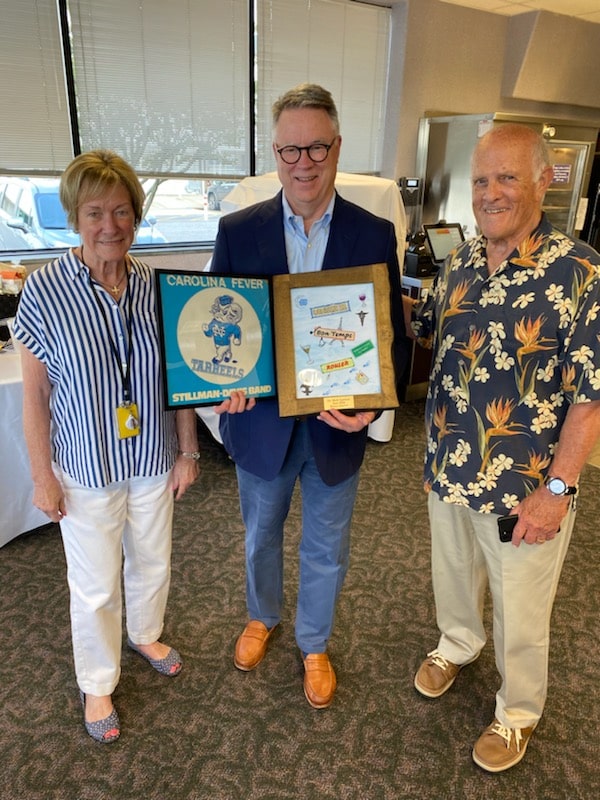
After medical school, Dr. Garrison began his emergency medicine residency at what was then Pitt County Memorial Hospital. When he completed his residency, Dr. Garrison became ECU’s first emergency medical services (EMS) fellow, and later the first Robert Wood Johnson Clinical Scholar from an emergency medical residency. “It was a huge honor for me because it’s a very competitive fellowship,” he said.
As his wife Lynne was completing her plastic surgery residency in Pittsburgh, Dr. Garrison recalls a conversation he had with Dr. Dan Pollock, a friend from the CDC. “Lynne and I were considering jobs at Johns Hopkins and in Greenville, and Dan said, ‘You have to go back to Greenville because that’s where you’ll make a difference.’ Thanks to Dr. Pollock’s advice, we made our way to Greenville for the second time.”
Since returning to Greenville, Dr. Garrison has served in many capacities: the founder and director of the Eastern North Carolina Injury Prevention Program, a professor of emergency medicine, the chief of the ECU Health Medical Center’s medical staff, the interim chair of emergency medicine, the associate medical director for the North Carolina Highway Patrol and the chair of the Pitt County Board of Health, among others. But one role, that of associate dean of Graduate Medical Education, has given him the opportunity to foster growth and continue his pursuit of lifelong learning.
“I didn’t have a long-term plan to work in graduate medical education,” Dr. Garrison said. “But I’ve always leaned towards leadership roles. What I like about GME is that you have oversight of all these programs to train medical school graduates to be physicians. I think it’s more important than medical school because it makes you the specialist you’re going to be.”
Under Dr. Garrison’s oversight, ECU’s Brody School of Medicine and ECU Health Medical Center now have more than 40 training programs, including residencies for physicians and dentists, sub-specialty fellowships and combined programs. Altogether, there are 410 physicians completing their post-medical school training at ECU Health. Dr. Garrison expressed pride at the GME program’s success, facilitated in part by diligent accreditation management and the program’s continued growth.
“We have two brand new programs: a fellowship in cardiac electrophysiology and a neurology residency. And we’re very excited to be deep in the planning for a new ophthalmology residency,” he said. Dr. Garrison also lauded the expansion of the internal medicine and psychiatry residencies, the addition of a critical care component to emergency medicine/internal medicine residencies (only the second such program like it in the country), the establishment of a pediatric dentistry residency, a hospice and palliative care fellowship, and the development of a rural family medicine residency.
The Rural Family Medicine Residency program began when Dr. Garrison and Dr. Mike Waldrum connected with Sen. Brent Jackson about starting a program to meet the needs of rural areas in eastern North Carolina. Sen. Jackson, a Sampson County native, wanted a rural residency for Duplin County, and with Dr. Waldrum’s and Dr. Garrison’s input, he put forth a proposal to the North Carolina General Assembly to appropriate funds for the new program, to be established in Duplin, Hertford and Halifax counties. “North Carolina is the second largest state in terms of a rural population,” Dr. Garrison said. “I think of rural as being issues with distance to health care, access to health care services, and impoverishment. That’s the heart of the Brody School of Medicine and ECU Health’s mission, and we do a pretty darn good job at it.”
Now the first cohort of four rural family medicine resident physicians graduated in June, along with the 125 physicians who completed their training on June 30. Earlier this year, Dr. Garrison learned that all four graduates of the rural residency passed their board certification exams in family medicine on their first attempt, and 50% of that class will be staying and working in rural eastern North Carolina and for ECU Health – one in Duplin and the other in Hertford and Beaufort counties. “It’s the thing I’m most proud of during my time in GME,” Dr. Garrison said. “It’s been five years since that visit with Sen. Jackson, and now ECU Health is the national model for a rural academic health system.” The newest rural family medicine program class includes nine resident physicians, making the program one of the largest rural residencies in the country.
For Dr. Garrison, his work in GME has been fulfilling, and he emphasized three important benefits of GME. One is that GME is a critical part of both the Brody School of Medicine and the health system. “Resident physicians and fellows provide a lot of care. They write about 75% of the orders written in the hospital, including admitting patients, medication prescriptions and all plan of care orders. The hospital depends a lot on resident physicians and fellows, and they are learning while they are doing,” he said.
ECU Health Medical Center and ECU Health Maynard Children’s Hospital serve as the primary teaching hospitals for The Brody School of Medicine at ECU, something Dr. Garrison noted as being a major factor in GME success: “Graduate medical education has always been about resident physicians and fellows employed by the health system working with faculty employed by the University.”
In addition to their vital role in the health system, Dr. Garrison said resident physicians promote lifelong learning for their instructors. “I had a professor at UNC who was asked why he taught at the university instead of making more money in private practice,” he said. “He said that every day a medical student or resident asked him questions he didn’t know the answer to – so he figured he should stay at the university until he knew everything. Our resident physicians and fellows keep us in the throes of learning.”
Perhaps most importantly, Dr. Garrison said that resident physicians and fellows serve as a pipeline for physicians that we need here in North Carolina. “One of the things we know is that residents are more likely to stay where they train than where they go to medical school,” he explained. “They serve as pipeline for the needs we have, especially for North Carolina. A GME program adds value in these ways.”
While these benefits may be applied to any GME at any medical school, Dr. Garrison emphasized that the Brody School of Medicine and ECU Health are special. “My experience, and that of almost any and every physician who trains here, is that they are going to get a phenomenal education,” he said. “This is one of the largest and busiest medical centers in the country. I tell resident physicians and fellows that if they come here and stay here, they will be really good physicians because they will be taking care of people with a variety of diagnoses and will be taught by talented professionals. It’s a fabulous place to train and that’s why our graduates are so capable.”
Although he has retired from his associate dean role, with Dr. Mary Catherine Turner stepping in as interim associate dean, Dr. Garrison isn’t going too far away. “I’ll be working part time helping with fundraising at the ECU Health Foundation,” he said. “I’m not done quite yet.”
Still, his presence in GME will be missed. Dr. Audy Whitman, the program director for the Rural Family Medicine Residency program, said Dr. Garrison’s impact has positioned ECU Health resident physicians and fellows for a brighter future. “He’s been a great resource and role model to me and has provided me with sage wisdom and infallible guidance as I worked to start our new Rural Family Medicine Residency. I am forever grateful and in his debt,” Dr. Whitman said. “Under his tenure, Dr. Garrison cultivated a thriving GME system that positively impacts hundreds of physicians training every year, which in turn positively impacts the lives of millions of North Carolinians served by our ECU Health system and graduates of its GME system. Dr. Garrison has been a force for good that is hard to find, difficult to replace and impossible to forget.”
Dr. Michael Waldrum, dean of Brody and CEO of ECU Health, echoed those sentiments.
“Graduate Medical Education is such an important part of who we are at ECU Health,” Dr. Waldrum said. “We are fortunate to have such a strong GME program, and that is a testament to Herb’s steadfast commitment, passion, dedication and leadership. Herb has contributed in so many ways to our organization, and highest among them is his outstanding leadership of our GME programs. We are deeply appreciative of his contributions which position us to continue our work as a world-class clinical training ground.”
On June 14, 2024, Dr. Brian Brodish, an otolaryngologist with Eastern Carolina ENT, in collaboration with ECU Health, performed his 100th Inspire procedure at ECU Health Medical Center. Inspire is an FDA-approved obstructive sleep apnea (OSA) treatment option for people who cannot use Continuous Positive Airway Pressure (CPAP) therapy.
“We have a high incidence of sleep apnea in eastern North Carolina, but a lot of patients can’t tolerate a CPAP,” said Dr. Brodish. “There’s a significant morbidity to not treating sleep apnea, and up until now, I had nothing to offer. This is one of the first successful surgical alternatives for our patients with sleep apnea.”
OSA affects 22 million Americans. When left untreated, it doesn’t just affect one person, but also those around them. OSA can cause vehicle and workplace accidents, worsening mood and memory, stroke, heart attack and other serious issues.
CPAP is the main treatment for OSA, but unfortunately a large percentage of people don’t see benefit from or can’t tolerate CPAP. Dr. Brodish is proud to offer Inspire as another treatment option for this population.
“Patients were feeling miserable and had nowhere to turn,” Dr. Brodish said. “I finally have a tool I can offer these patients and we’re seeing fantastic results. It’s a low-risk procedure and patients recover in a few weeks.”
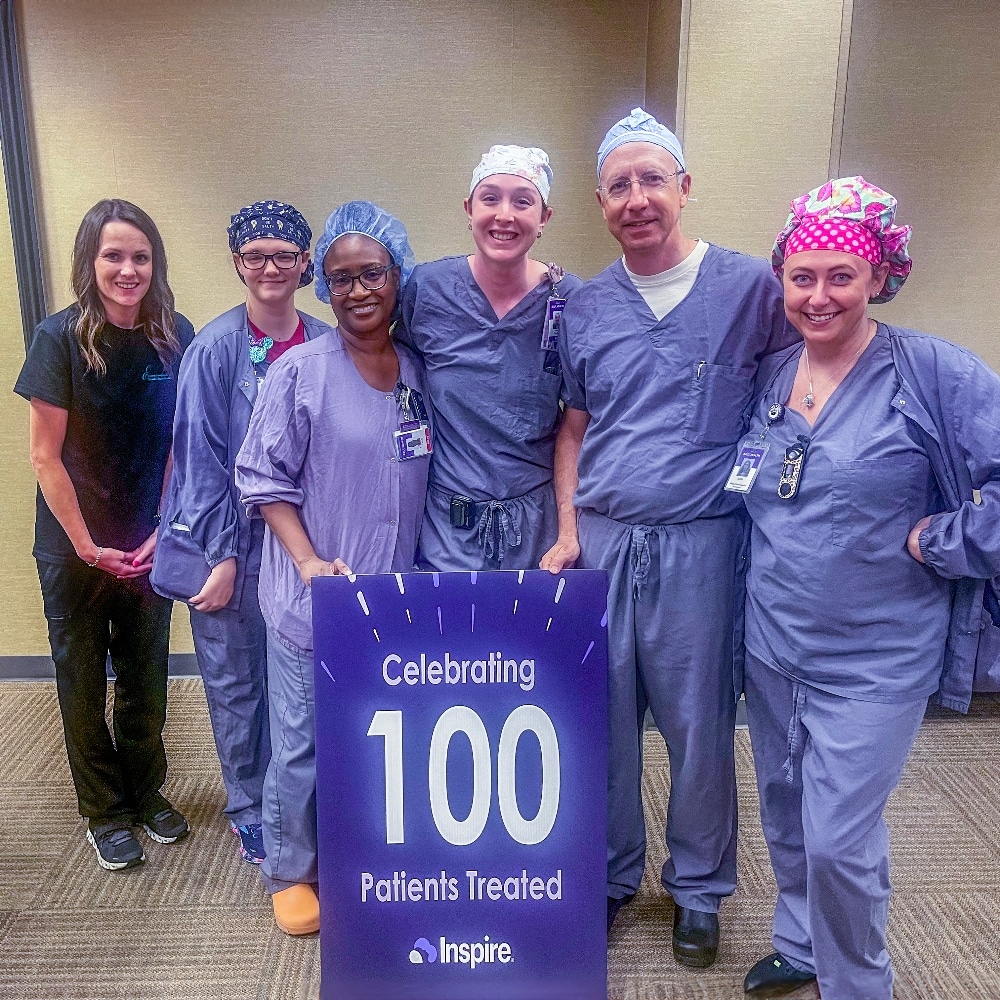
Inspire works inside the body with a patient’s natural breathing process to treat sleep apnea. Mild stimulation opens the airway during sleep, allowing oxygen to flow naturally. The patient uses a small handheld remote to turn Inspire on before bed and off when they wake up.
“We want the patient to use the device for at least four hours a night or more, and we are looking for their apnea-hypopnea index (AHI), which is the number of times per hour a patient stops breathing, to be below 15,” Dr. Brodish explained. “Some of our patients stop breathing more than 50 times a night before treatment, but 80 percent of our patients have achieved our goal of 15 episodes or less. Some have even achieved zero.”
The Inspire system is implanted during a short, outpatient procedure. The system is placed under the skin of the neck and chest through two small incisions. Most patients return home the same day and take over-the-counter pain medications to manage pain as needed.
“We are excited to have completed the 100th Inspire procedure at ECU Health Medical Center,” said Dr. Brodish. “This option is a part of ECU Health’s goal to provide state-of-the-art, high-quality care for eastern North Carolina, and we’re seeing patients benefit from this technology.”
Cheryl Hooks, a family nurse practitioner (FNP), is a Rose Hill native who started her career cutting hair. “For a very long time, about 20 years, I worked as a cosmetologist and I owned my own beauty salon,” Cheryl said.
Things changed for her and her close-knit family when they learned her oldest niece, nine years old at the time, had juvenile, or Type 1, diabetes.
“She got sick and had to go to the hospital, and that’s how they found out she was diabetic,” Cheryl said. “It was very scary because no one really knew what to do or how to help her.”
Cheryl wanted to learn all she could about the illness, including about medications and diet, so she could better support her niece; but in the process, she realized she wanted to advocate for all individuals with health problems. That’s when she decided to become a nurse.
Making the shift to nursing wasn’t easy. “I was older and trying to manage my time. You go from a point where you are your own boss to not having that freedom because you’re in school,” she said.
Still, her desire to take care of people inspired her to keep going. After graduating with her RN from Wake Technical Community College in Raleigh, Hooks worked at ECU Health Duplin Hospital while pursuing her BSN from the University of North Carolina (UNC) at Wilmington. She started her health care career in behavioral health, and later worked in the emergency department, where she realized the need in her community for primary care services. As a result, she went back to school to pursue her doctor of nursing practice degree in family medicine from UNC Chapel Hill, from which she graduated in 2022.
While she sometimes misses her work as a cosmetologist, Cheryl said many of the skills she used in her salon inform the way she works with her patients today.
“Owning a business gave me confidence. I was introverted, but taking care of my clients gave me self-assurance,” Cheryl said. “I treasure the trust between me and my patients, and the skills I used behind the chair trickled down to patient care.”
Cheryl now practices at ECU Health Family Medicine – Kenansville, a multi-specialty family medicine clinic, and she loves her team.
“I am thankful for the people I work with and for the opportunity to work in a rural setting,” she said. “A lot of people have the misconception that in rural areas you don’t get to see as much as in other places, but we do. We get to see many things nurses don’t often get to experience – we have family medicine, orthopedics and cardiology all in the same place. We learn so much because the resources aren’t as vast.” Cheryl also enjoys working near her hometown. “I am not a city girl, and I knew I wanted to work closer to home. Now I get to take care of people in my own community,” she said. “I still get to take care of the ladies who sat in my salon chair; now I make sure they’re healthy.”
For those considering a career change to health care, Cheryl has a few words of wisdom. “I say go for it. If you’re not on the path that’s fulfilling you, take that first step. It’s never too late to do what you are meant to do; there’s no expiration date on your dreams.”
*Since this story’s production, Cheryl Hooks has left the health system.
